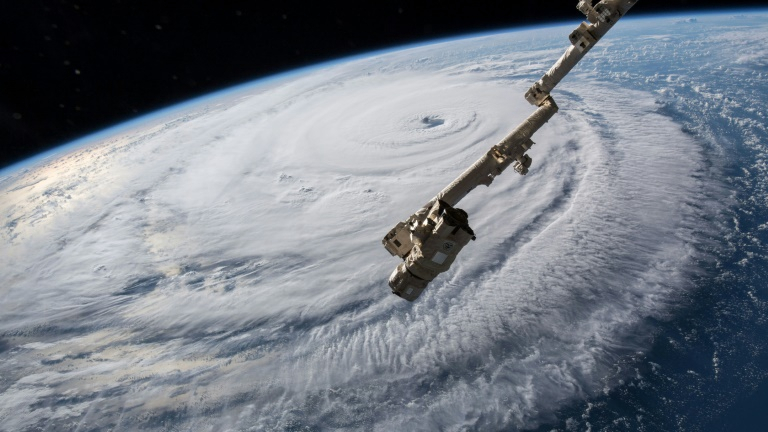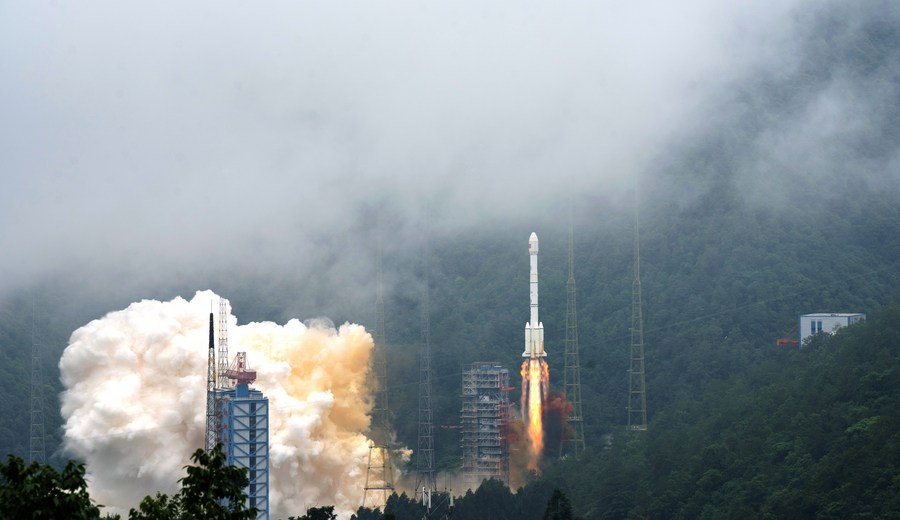
Editor's note: Andrew Korybko is a Moscow-based American political analyst. The article reflects the author's views and not necessarily those of CGTN.
Chinese President Xi Jinping praised his country's space program earlier this week for helping all of humanity better understand the cosmos. China has a lot to be proud of in recent years. It became the third country to successfully make a soft landing on the moon with its Chang'e 3 rover in 2013. Six years later in 2019, Chang'e 4's landing on the dark side of the moon became the first time that humanity ever explored that part of Earth's satellite up close.
Last year, Chang'e 5 returned to Earth with 1,751 grams of lunar soil, making China only the third country to ever do that. Just this week, the Tianwen-1 spacecraft entered Mars' orbit in preparation of dropping a probe there some time this summer. It also plans to launch the first module of its Tianhe orbital space station later this year.
Some Western voices have dishonestly presented China's space advancements as part of a so-called "space race", but nothing could be further from the truth. Beijing isn't "racing" anyone into space, it's simply fulfilling its obligation to the rest of humanity to explore the cosmos and enhance everyone's knowledge of the solar system.
After all, the former Soviet Union was already the first country to put both satellites and human beings into space in 1957 and 1961 respectively. The U.S. then became the first country to land a person on the moon in 1969. During the Cold War, both of them pioneered space exploration to distant planets too. Regrettably, the U.S. opted to neglect its space program soon thereafter for unclear reasons, while the Soviet Union's dissolution in 1991 created serious years-long challenges for its Russian successor state's program.
All the while, China never took a step backwards but steadily continued to make progress on humanity's last frontier. Its latest successes are the result of decades' worth of hard work and commitment, as are its ambitious future plans. Unlike the U.S., China has no interest in dangerously militarizing outer space, though it'll certainly respond to America's provocations there in order to defend itself.
China's space program is purely peaceful and scientific, as every country's should be. It solely aims to improve mankind's knowledge of the stars. There's no profit-driven incentive either, once again, unlike the U.S. Some Americans have talked about mining outer space, and Elon Musk's SpaceX wants to commercialize space launches and travel. These activities could be useful, though they mustn't be self-interested or exclusive, but to everyone's benefit.

A rocket carrying the last satellite of the BeiDou Navigation Satellite System (BDS) blasts off from Xichang Satellite Launch Center in southwest China's Sichuan Province, June 23, 2020. /Xinhua
A rocket carrying the last satellite of the BeiDou Navigation Satellite System (BDS) blasts off from Xichang Satellite Launch Center in southwest China's Sichuan Province, June 23, 2020. /Xinhua
For instance, China plans to one day establish a lunar base for scientific purposes. Recent reports suggest that it might even do so in partnership with Russia. Those two countries have become extremely close in recent years, even cooperating on an early missile warning system and agreeing to notify one another of ballistic or space rocket launches. This speaks to their deep trust of one another, which can naturally extend into outer space considering the very similar technologies involved.
It would make sense for the Chinese and Russian space programs to pool their knowledge together in order to help the rest of the international community better understand and explore the moon, to say nothing of the rest of the solar system. Ideally, the U.S. would join in their efforts as well, but unfortunately America only perceives space through a paranoid security-centric view.
American officials are obsessed with seeing so-called "threats" everywhere that they look, and this especially includes everything concerning China nowadays. Instead of praising China for its recent successes and visionary plans, they're fear-mongering that it's all part of a new so-called "space race" and might somehow result in what they officially regard as their "peer competitor" militarily leveraging these advancements against them one day.
In response, they've decided to begin the unprovoked militarization of outer space through former President Donald Trump's "Space Force", which might disastrously result in a self-fulfilling prophecy of unnecessarily increasing competition and tension in that domain. If President Joe Biden is serious about stabilizing the chaotic country that he inherited from Trump, then he should reconsider these plans.
In fact, it can be argued that space cooperation between China and the U.S. would be a very symbolic way to improve relations between these two countries, just like if they worked more closely together to combat climate change and the COVID-19 pandemic. Apolitical examples of cooperation such as these could go a long way towards restoring the trust between them that was severely damaged under Trump.
It would also benefit every person on Earth since these powerful countries veritably have the capabilities to make meaningful changes for the better so long as the political will to do so is present on all sides. China is eager to work with the U.S. in all fields in other to move past the outdated Cold War-style thinking that's infected the American leadership in recent years, so the onus is on President Biden to take advantage of this historic opportunity.
(If you want to contribute and have specific expertise, please contact us at opinions@cgtn.com.)

